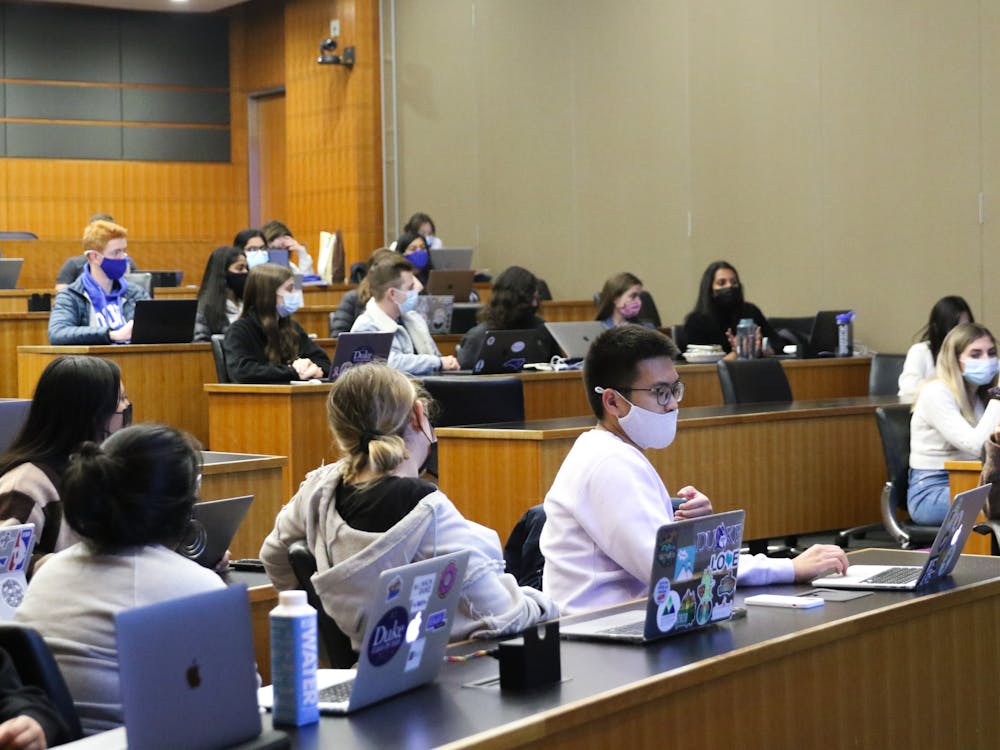Duke Student Government senators confirmed tenting policies and held committee presentations of upcoming projects at their last meeting of the semester.
Seniors and Head Line Monitors Caroline Bower and Cameron Jarnot presented updates on tenting policies to DSG. Using the same schedule structure as the 2019-2020 season, Black Tenting will last two weeks starting Jan. 9 at 5:00 p.m., Blue Tenting will continue for two weeks starting Jan. 23 at 5:00 p.m. and White/Flex Tenting will last for two weeks starting Feb. 6. These dates were set to avoid tenting on the first day of classes and allow tenters enough time to prepare and not have to set up during the men’s basketball game against Miami on Jan. 8. Night hours remain unchanged—1:00 to 7:00 a.m. from Sunday to Thursday and 2:30 to 7:00 a.m. from Friday to Saturday.
The proposed policies revert back to the original walk-up line policy after the new flexible start time enacted at the start of the year “caused more problems than it intended to resolve,” the presentation read.
Students can now register for the walk-up line two hours after the end of the previous game via scheduled registration times or direct contact with line monitors. Line monitors will also work with the Disability Management System to ensure students with disabilities can also participate in the process.
If tenters test positive for COVID-19, they must let the line monitors know as soon as possible. The head line monitors and vice presidents of tenting will have “final discretion over how to handle the situation,” read the presentation.
At any point of tenting, if three or more students test positive in a tent, the tenters should contact the head line monitors to discuss accommodations. During Black or Blue Tenting, if one or two students within a tent are positive at a time, the tent will then have one to two fewer people required in the tent for night hours. Since the COVID-19 situation continues to develop, these regulations are subject to change.
DSG cabinet directors and each senate committee presented summaries of the projects they are leading. Plans seek to extend previous projects enacted by DSG, create databases to better understand the needs of Duke students and propose new groups under the DSG umbrella to give undergraduates a voice.
Cabinet members met with various groups, including disability organizations, student multicultural and identity groups, environmental organizations, Duke University Union, Duke Sexual Harassment and Assault Prevention and Education, the Duke International Association, the Center for Sexual and Gender Diversity, the Interfaith Caucus, religious groups and the Student-Athlete Advisory Council to further their cabinet missions.
Cabinet directors for Religious Outreach and Affairs, Racial and Multicultural Diversity and Outreach and Disability Rights Advocacy and Policy are also continuing conversations about space for student groups, such as the Career Center, with campus administrators.
Cabinet initiatives also include newspapers to further incorporate information about student groups to the student public and allow them to add “additional avenues of advocacy and communication,” read the presentation.
Both the directors of Gender Equity and Violence Prevention and LGBTQIA+ Affairs and Policy are working with SHAPE to support and amplify projects and promote “inclusive and intersectional dialogue surrounding sexual assault,” according to the presentation.
Senators also hope to support the efforts of minority groups and students on-campus. Meeting with directors of current ethnic studies programs and student groups listing ethnic studies as their demands, senators hope to take the first step in creating the “decades-long movement for Asian-American, Latinx, Indigenous, and Middle Eastern Studies,” according to the presentation.
DSG will also establish a mandatory, in-person anti-bias and anti-harassment training for student leaders in fall 2022 and create an incoming class breakdown by ethnicity.
To better support international students, Senators are establishing a new Curricular Practical Training course to allow international students to intern during the spring and fall semesters. They also have plans to better integrate Duke Kunshan University students into Duke’s campus by establishing a semester-long position for DKU students with the long-term goal of creating a DKU Student Union.
In Other Business
Senators recognized Duke American Society of Mechanical Engineers, which seeks to foster an engineering community on campus through opportunities for aspiring mechanical engineers; Morgan’s Message, an organization looking to destigmatize mental health conversations among student athletes; and chartered Shave and Buzz, a supporting organization of the I’m Not Done Yet Foundation planning an annual shave in the spring semester to promote cancer awareness.
Senators also confirmed new DSG Research Unit analysts: juniors and DSGRU co-directors Karam Oubari and Chris Yang, sophomore and DSGRU cabinet member Brandon Li, junior Ethan Donecoff, sophomore Nitisha Gautam and first-years Michelle Qiu, Rayan Malik, John Sarantou, Katie Kotler, Austin Brown and Kulsoom Rizavi.
DSG passed a statute to establish a task force meant to “review documents and [recommend] changes to the Internal Affairs Committee to draft amendments,” read the document.
DSG allocated $288 to the Services and Sustainability Committee to print A-frame signage from the Duke Copy Center to collect feedback about the timelines of Duke buses.
Get The Chronicle straight to your inbox
Signup for our weekly newsletter. Cancel at any time.

Audrey Wang is a Trinity senior and data editor of The Chronicle's 120th volume. She was previously editor-in-chief for Volume 119.

